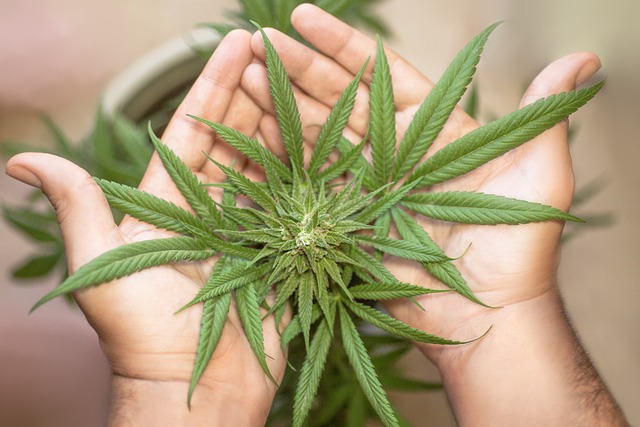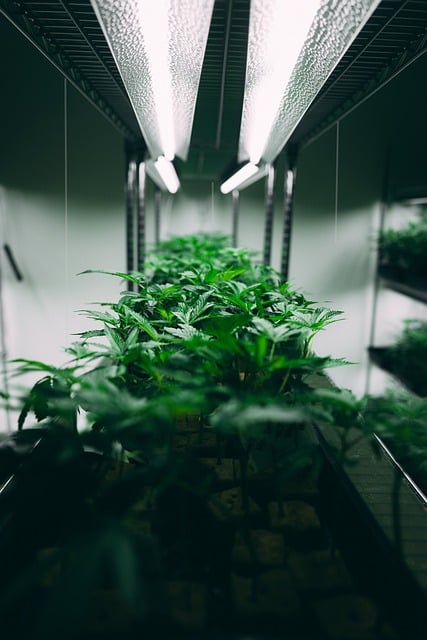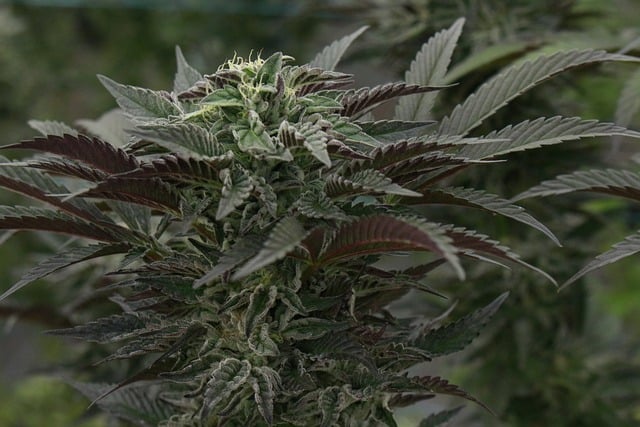The THCA flower, a non-psychoactive cannabinoid found in the Cannabis sativa plant, has been recognized for its significant natural anti-inflammatory properties. Unlike THC, it does not alter mental states, making it suitable for health-conscious individuals. The THCA flower contains anti-inflammatory compounds like CBD that interact with the body's endocannabinoid system to influence pain and inflammation regulation. Studies suggest that THCA can inhibit certain inflammatory enzymes and modulate receptors, offering a natural way to manage conditions characterized by excessive inflammation, such as arthritis and multiple sclerosis. The anti-inflammatory efficacy of THCA flower is notable for its ability to target the root causes of inflammation without the mind-altering effects associated with THC. This has sparked interest among researchers and medical professionals as a potential new therapeutic option for alleviating symptoms related to inflammation, aligning with the growing trend towards plant-based and holistic health solutions.
discovers the transformative potential of THCA flower, a natural remedy revered for its anti-inflammatory properties. This comprehensive exploration delves into the science underpinning its healing abilities, shedding light on how this raw cannabinoid can potentially alleviate inflammation. We’ll navigate through its composition and cultivation to ensure you understand how to grow and harvest high-quality THCA flowers for optimal health benefits. By examining its anti-inflammatory mechanisms in detail, the article illuminates therapeutic applications for those suffering from inflammation-related conditions.
Key considerations, including dosage and consumption methods, are outlined to maximize the anti-inflammatory effects of THCA flower. The comparison between raw and decarboxylated THCA flower’s impact on inflammation reveals insights into their differing benefits. Additionally, the article addresses the entourage effect, highlighting how THCA flowers synergistically work to reduce inflammation. Legal aspects and accessibility are also discussed to ensure informed use of this compound. Safety profiles, potential side effects, and integrating THCA flower into a holistic anti-inflammatory lifestyle are covered to provide a balanced view. Future research directions offer a glimpse into the evolving understanding of THCA’s role in inflammation, complemented by patient experiences sharing real-world applications and personal anecdotes. Lastly, sourcing and selecting the best THCA flower for anti-inflammatory purposes are addressed to ensure a therapeutic experience.
- Unveiling the Potential of THCA Flower: A Natural Anti-Inflammatory Agent
- The Science Behind THCA Flower's Anti-Inflammatory Properties
Unveiling the Potential of THCA Flower: A Natural Anti-Inflammatory Agent

Unveiling the Potential of THCA Flower: A Natural Anti-Inflammatory Agent
The tetrahydrocannabinolic acid (THCA) flower, a non-psychoactive cannabinoid found in the Cannabis sativa plant, has garnered attention for its potential therapeutic properties, particularly as a natural anti-inflammatory agent. THCA is the precursor to THC, the psychoactive component of cannabis, but unlike THC, it does not induce psychoactive effects. This makes THCA an attractive option for those seeking the potential health benefits without the high. The anti-inflammatory compounds present in THCA flower, such as cannabidiol (CBD) and other cannabinoids, interact with the body’s endocannabinoid system, which plays a crucial role in regulating various physiological processes including pain, immune response, and inflammation. Research suggests that THCA may inhibit certain enzymes and modulate receptors involved in the body’s inflammatory response, offering a natural approach to managing conditions characterized by excessive inflammation.
Furthermore, the therapeutic potential of THCA as an anti-inflammatory agent is supported by both preclinical and clinical studies. These studies indicate that THCA may effectively target various pathways associated with inflammation, making it a promising candidate for the development of new anti-inflammatory treatments. The natural approach to managing inflammation, as offered by THCA flower, aligns with a growing consumer interest in plant-based and holistic health solutions. As such, the exploration of THCA’s anti-inflammatory properties continues to expand, offering hope for those seeking alternative or complementary strategies to address inflammatory diseases.
The Science Behind THCA Flower's Anti-Inflammatory Properties

THCA, or tetrahydrocannabinolic acid, is a naturally occurring compound found in the raw cannabis plant, which, upon heating, decarboxylates into THC, the psychoactive component commonly associated with cannabis. However, it is the THCA form that has garnered attention for its potential anti-inflammatory properties. Recent scientific studies have isolated and examined the effects of THCA on inflammation, revealing mechanisms that may underpin its therapeutic benefits. These studies suggest that THCA interacts with the body’s endocannabinoid system through its affinity for both CB1 and CB2 receptors, modulating the immune response and reducing pro-inflammatory cytokine production. This action is believed to be particularly effective in conditions characterized by excessive inflammation, such as arthritis and multiple sclerosis. The anti-inflammatory compounds present in THCA flower have been observed to target the root causes of inflammation without inducing psychoactive effects, offering a promising avenue for the development of new therapeutic agents. Furthermore, these compounds exhibit a broad spectrum of activity against various pathways involved in inflammation, making them a subject of growing interest in both scientific and medical communities for their potential to alleviate inflammatory symptoms without the high associated with its decarboxylated form, THC.
THCA flower emerges as a promising natural alternative for those seeking anti-inflammatory relief. Its potential, rooted in scientific evidence, positions it as a valuable component in health and wellness routines. As research continues to unfold the breadth of its benefits, users can look forward to harnessing THCA flower’s properties for holistic care. This natural compound offers a compelling alternative, with anti-inflammatory effects that warrant further investigation and consideration in various therapeutic applications.
